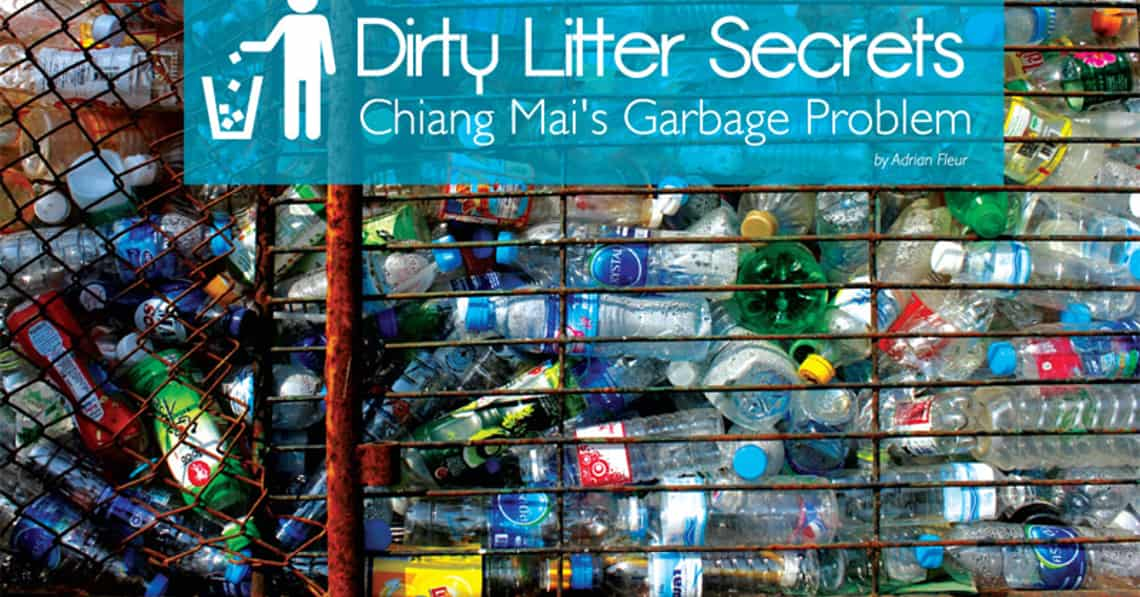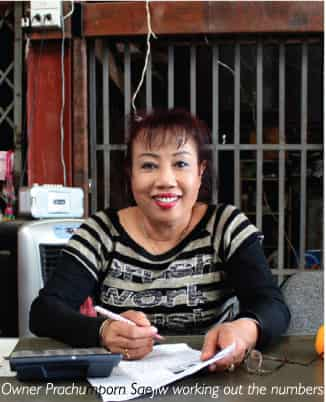
The owner, a stern-looking woman named Prachumporn Saejiw, sits behind a desk covered in piles of coins, meticulously recording sales in a weathered notebook, her calculator whipped out every few seconds to face the customer with an offer for their trashy treasure. She charges the standard rates for individuals dropping off their recyclable rubbish: plastic is worth the most at eight baht per kilogram, with metal coming in at seven baht, paper at two baht and glass at 80 satang. It’s no wonder the centre is busy all day, when one considers the many people trying to make a decent living in the city, perhaps on top of their minimal incomes.
That doesn’t mean Prachumporn can be taken for a ride, though. “I don’t want the municipality’s trucks to drop their garbage here,” she tells me. “It’s too much work for my employees and the garbage is always so smelly!” Prachumporn explains that many individuals who collect trash for recycling purposes are kind enough to clean the items first, with some households using separate bins for their families to throw their waste into. This makes the sorters’ lives much easier and speeds up the whole recycling process. “Everyone should separate their garbage at home, so Chiang Mai can be clean and beautiful,” she adds.
In addition to Prachumporn’s centre, there are countless others scattered around the outer suburbs of Chiang Mai, and even a few closer to the city. She doesn’t know anything about them though, as they all seem to be privately run with no support from the municipality. She elaborates, “I’ve been doing this for 20 years. It’s my own business and my own land. And I will be doing it for 20 years more because there is always more garbage to clean and sort.”
Most of us living in Chiang Mai have noticed the bags of empty plastic bottles placed alongside the regular rubbish bins outside our block of flats, or perhaps at the end of the street where all the trash gets rounded up. Those are small recyclable gifts that are much appreciated by their collectors, who often have no other means of making their way besides gathering bits and pieces of garbage to exchange for a small sum of money.
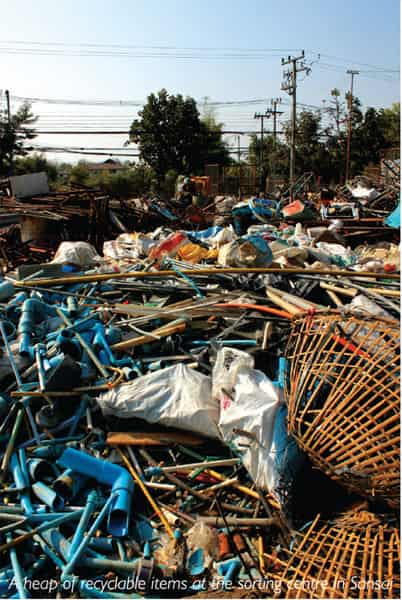
While investigating a nearby abandoned building for another story, I came across the living quarters of a man who was clearly struggling to survive. His makeshift bed on the floor was filthy and clearly not keeping him warm at night, and as I was about to leave the area with a heavy heart, I noticed a large stockpile of plastic bottles in the corner. This man was obviously making some money by rummaging through rubbish for recyclable goods, and I thought of all the “environmental angels” like him, scraping through our precious discards.
While the poorest of the poor do their bit to paint our city green in a bid for some baht, the average person in Chiang Mai throws away around 0.8 – 1 kilogram of garbage a day, which has to be dealt with by the municipality. According to Mayor Tassanai Buranupakorn, the municipality’s waste removal trucks manage to collect 300 tonnes of garbage a day within the 40 square km municipality area. All the garbage is driven to Hod District, 100 km outside of the city, three times a week. Tassanai says that although the city has a five-star garbage management system, individuals still need to be more responsible for their own waste.
Chiang Mai’s small municipality area only has about 160,000 permanent inhabitants, while at least a million people live within the greater metropolitan area. With numerous neighbourhoods being left to discard their rubbish as they see fit, the problem of mini-landfills springing up around the city is becoming more evident. Chiang Mai suffered rapid urbanisation in recent years, along with a city centre population density that is bursting at the seams (last recorded figures from 2008 puts the municipality density rate at 3,687 people per square km, compared to less than 300 per square km for Hang Dong District). Along with the growth and already-inefficient waste management system, the city is now in trouble.
Mayor Tassanai stresses that education is the most vital means of reducing litter and creating better attitudes about the environment of Chiang Mai. He agrees that households need to separate waste, ultimately making the trash easier to recycle. And yes, people’s livelihoods rely on being able to pick out recyclable goods from rubbish, but the mayor says, “Honestly, nobody wants to sort through garbage. That’s not the life I want for people.”
Money is, of course, a problem for the municipality. Only 200 garbage-collecting personnel make the rounds through the city every day, and the municipality has now begun outsourcing to other companies to reduce their costs. Their goal is to acquire the expensive machinery required to turn waste into energy, and create new policies allowing them to take more charge of recycling. At the moment, the mayor says, “I’m happy with the level of collection. Litter is still a major problem though, which people can reduce by being more considerate. Our trucks collect the rubbish during non-peak hours, but then people decide to take their rubbish outside at 3 a.m., for example, leaving time for the rats and dogs to go through them and make a mess. Individuals mustn’t be lazy; they must care more about their city.”
And individuals are not just people in their homes, throwing unsorted garbage into their bins. Individuals are also street food sellers on the side of the roads or at markets, who leave behind heaps of plastic at their business spots every night for street-sweepers to swiftly clear away in the early morning. Individuals are also those working in bars and restaurants that leave their food waste outside their buildings to attract pests and rot away in the heat of the daytime. And perhaps the worst culprits of all? The individuals who dump tonnes of litter along previously-pristine stretches of land dotted with trees and flora. Individuals are each and every one of us, who can make a difference with the way we go about our daily lives, and never overlook or tolerate these environmentally and aesthetically detrimental crimes against our city.
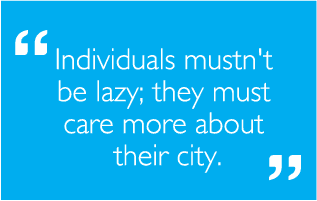
And yet, there are laws in place against such environmental offences. According to the Public Cleanliness and Orderliness Act (1992), individuals are prohibited from causing dirtiness to streets and public places throughout the country. So, while littering is technically illegal in Thailand, with potential fines up to 2,000 baht if caught, it is still a common occurrence. Compared to most developed countries, 2,000 baht is a laughable punishment for an offence which is currently crippling Thailand’s beauty.
The most littered item in the world is cigarette butts, which can take up to five years to completely biodegrade. Of course, this is a far cry from Thailand’s favourite item to litter: plastic. Plastic bags are found shoved into every nook in every city in the country, including walls, pavement cracks and sewers. The scary thing is, each one takes anywhere from 450 – 1000 years to decompose, and it is estimated that around 96 percent of the world’s plastic goes unrecycled. Plastic film or packaging takes up to 30 years and plastic bottles will only start to break down after 450 years.
One solution for Chiang Mai’s plastic bag obsession could be to charge customers for each bag, just as many countries now do all over the world, or offer an incentive for using cloth bags or no bag at all. Another act that would help reduce litter is for it to become a reportable offence to any police officer, along with a reward, or perhaps, a fine for not only the litterbug but also whoever is with him (you might think twice about dropping that soda can if your friend would face the consequences too). Regular clean-ups of your neighbourhood would also make a positive impact and spark important discussions: when I take a few hours to pick up litter near my apartment, I attract all sorts of curious bystanders. Some of them think I’m bonkers, but some of them decide to lend a hand.
Ten Tips to Keep Chiang Mai Beautiful:
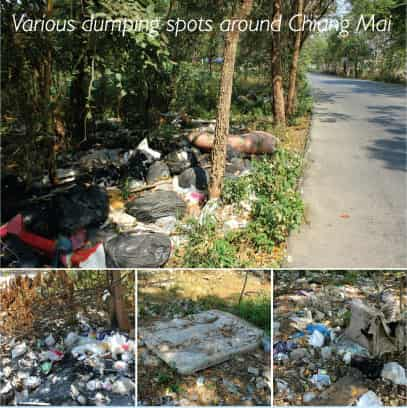
2. Buy in bulk so you throw away fewer packaging items, and invest in higher-quality products that might be more expensive but will last longer. Too many cheap kitchen and electronic appliances often end up in the trash soon after their warranties expire.
3. Don’t accept the standard behaviour in Chiang Mai of overusing plastic bags. Do you really need a bag to carry one packet of M&Ms and a Coke? For larger shopping trips, carry old plastic bags or reusable cloth bags with you. When you are offered a bag, say no thank you, or “mai sai thoong krap/ka” which means “I don’t want a bag with that, thanks.” Most people will listen and some will even smile when handing you your items.
4. Don’t ever let useful items make their way to a rubbish dump. There are plenty of foundations, orphanages and refugee camps nearby which will gratefully take your old clothes, shoes, blankets, toys, school supplies, books, building materials, etc. Free Bird Café, for example, will take just about anything: www.facebook.com/FreeBirdCafe
5. If you have a few spare hours on a Sunday afternoon, do something proactive and take a stroll around your neighbourhood picking up litter. It’s a great way to get your neighbours interested and might be an opportunity for future clean-ups to be organised in your area.
6. If you are lucky enough to have a garden (or know someone else who does), make sure you turn your food waste into nutrient-rich compost. You can compost pretty much any food waste besides meat, fish, dairy and oil products – it’s very easy. Visit www.eartheasy.com/grow-compost.html to learn more.
7. Speak up! If your friends or family litter in front of you, let them know you find it unacceptable and tell them why, so they will also want to keep their city beautiful.
8. Drive the demand for sustainable, recycled products: there are many trendy clothes, furniture, toys, office accessories, packaging and more which are made from recycled materials being sold all over Chiang Mai and online.
9. Buying bottled water is expensive and generates a large amount of container waste, so fill up a favourite bottle or jug instead – there are many water-filling stations around the city and in some workplaces that are certified clean and potable.
10. Visit one of the many sorting plants around the city, to see for yourself the magnitude of recyclable items that people work very hard to separate for very little pay. When you see recyclable-item collectors around, consider supporting them by regularly giving them your separated trash, or perhaps even a tip for their tireless tasks.
For more information and tips on how to create a greener future, visit:
Thailand Environmental Institute Foundation: www.tei.or.th
Worldwatch Institute: www.worldwatch.org
The Daily Green: www.thedailygreen.com
Related Article: Wasting Away: Chasing Chiang Mai’s Rubbish Trail
